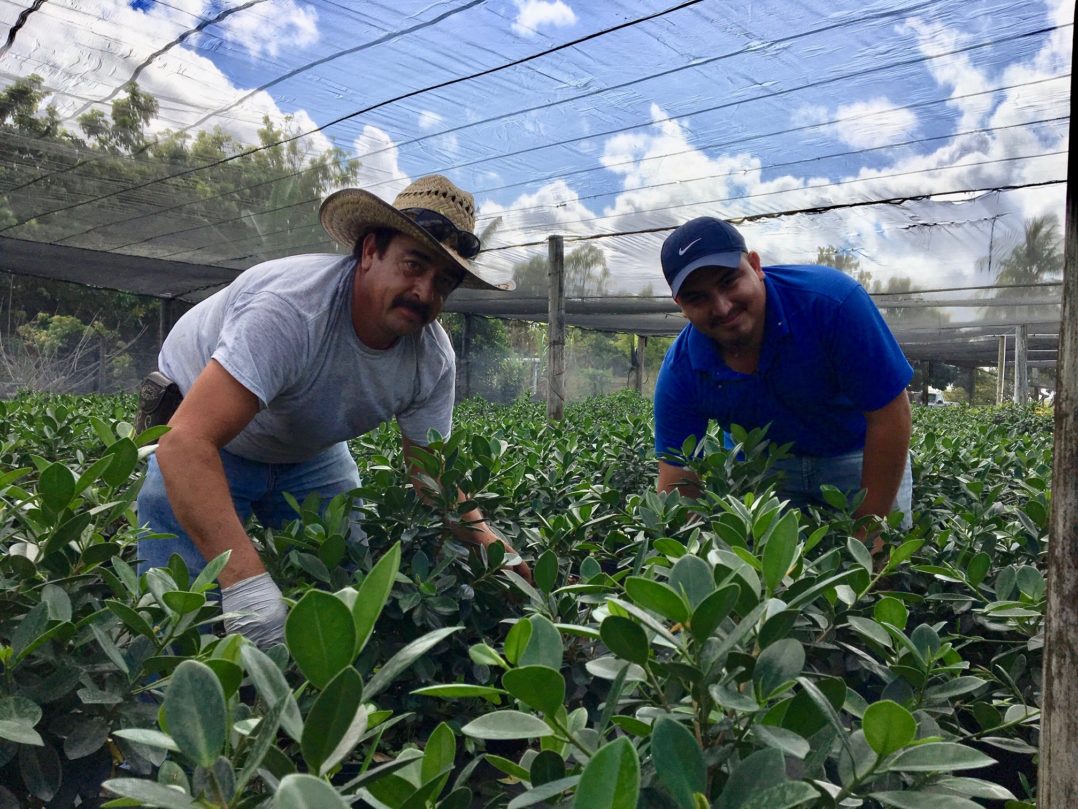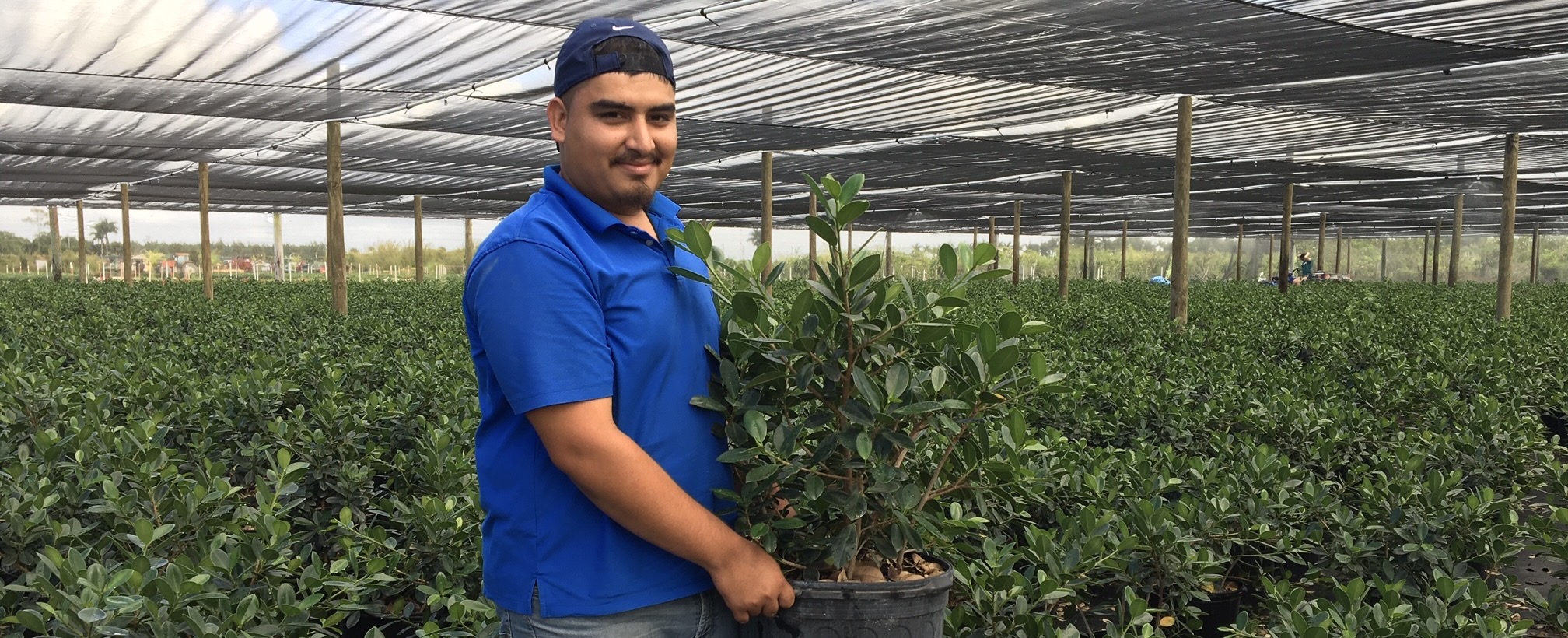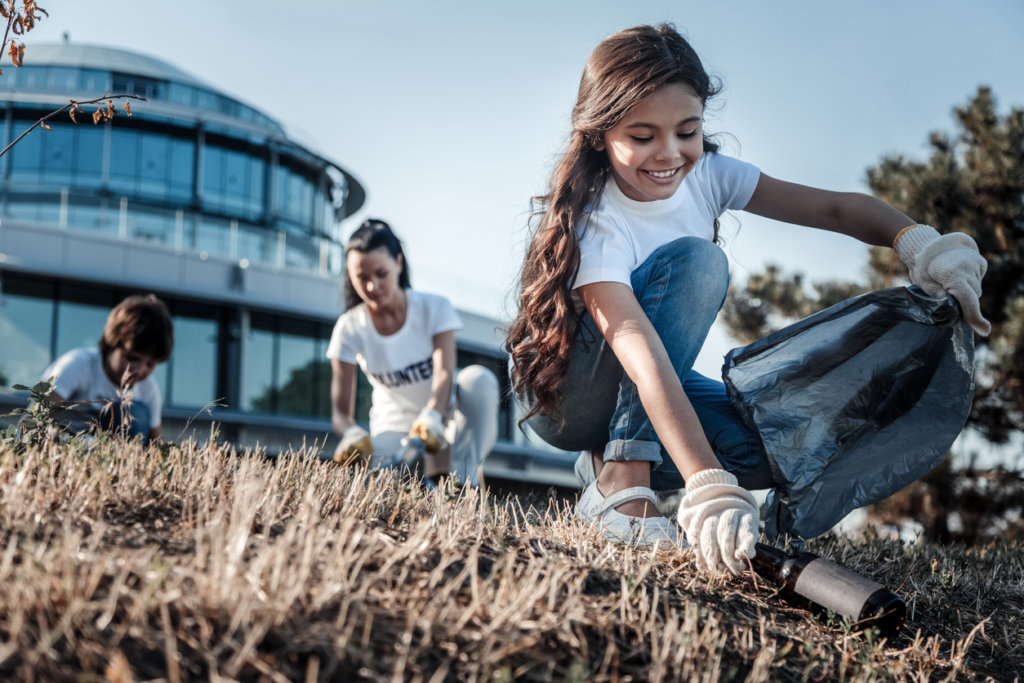Back to the Land: A Florida Farmworker Youth Grows His Family’s Plant Nursery, Helps the Environment with STEM and Business Studies
When he’s not in class, Manuel Ponce, 21, is working the fields in the rural community of Homestead, Florida. This probably sounds familiar, even depressing to many young people from farmworker communities, but Ponce couldn’t be more excited.
He and his family emigrated to Homestead in 2006 with the goal of opening a small farm like the one they had in Mexico. Since they lacked the funds to build out major commercial-sized vegetable crops, they struck a deal with some landowners whose permanent residence is in the Midwest. In exchange for watering and weeding the vegetation on their one-acre property, they would grow their own decorative plant nursery and profit from the sale of its products.
Rabbit Nursery, is a risky but important business, especially in Florida, and especially this time of year. That’s because hurricane season started June 1, and now, more than ever, the region needs vegetation. And while the nursery is susceptible to storms, the majority of the hardy shrubs and plants it grows are the same ones used in landscaping for businesses and public properties such as parks and beaches, making the nursery an asset for replacement plants after major storms. This is especially important to low-lying areas which take a direct hit from the wind, rain, and storm surge.
It certainly contributed to Rabbit Nursery’s bottom line in 2017 after Hurricane Irma. They lost about half of their products, but they were able to nurse the remaining plants back to life and sell them to businesses and municipalities recovering from the storm damage.
Another contributor to Rabbit Nursery’s success was Ponce’s participation in Career Explorations, a high school program for children of migrant farmworkers run by the UnidosUS Affiliate Mexican American Council. It helped him think more critically about the costs of college, the personal and financial gains he could make in various industries, and what giving back to his family or community would look like.
“At first their career goals might not be as aspirational as they should be, but as they see the promise and the talents that they have, they see opportunities for an amazing career, and they actually believe they can do it,”says Eddie Garza, executive director at the Mexican American Council (MAC).
The program also provided Ponce with a two-year scholarship to Miami Dade College. Ponce had originally planned to become a police officer, and then eventually attend law school. But during his first year of studies, he stumbled upon the Horticulture Club, realized he knew a thing or two about the topic, and enrolled in several landscaping and business classes, all while working with his parents at home on the land.
“We started talking and planning out how can you effectively help your parents,” says MAC Program Manager Marilu Villa. “We said ‘your parents have a nursery, why don’t we look into business administration because your parents don’t have that background?’”
During his associate degree, Ponce discovered new ways of planting and obtaining credit. This helped him enter the family into a rent-to-own agreement with the landlords, purchase farming equipment, and buy seven more acres of land, all moves that have led Rabbit Nursery to double its production.

“Most of us that come to the United States want to make some money off of something that doesn’t involve agriculture, because they say it’s the American Dream and that we should be doing something better than just the agriculture field, “ says Ponce, noting that many Latinos envision that dream in terms of fields like medicine and law, “but it’s a really nice feeling to be working and helping the environment.”
There’s little doubt the United States could use more young professionals like Ponce farming for the environment and for food, especially as the climate heats up and prices for just about everything soar. In fact, during the last decade, frustrations over gentrification and the cost of living in large cities, combined with concerns about nutrition and so-called food deserts in low-income communities, have prompted a trend in small-scale farming, and it’s starting to take root among minorities.
“Young people are very interested in sustainability. They’re growing up in a world where climate change discussions have always existed, so they’re passionate about making an impact,” notes Mary Tiedeman, a doctoral student of Agro-Ecology at Florida International University, South Florida’s largest higher-ed institution, and a popular school for Miami Dade College graduates looking to continue their studies.
Planned well, farms and plant nurseries both large and small can have a positive impact on the health and economic outlook of a community. And with so much talk about water quality and conservation, finding alternatives to plastic packaging, and producing greater yields of foods without potentially harmful chemicals and genetic modification, young people today could use their life experiences and college careers to address hundreds of environmental and agricultural concerns.
“We even have students who are psychology and philosophy majors getting introduced to agri-science and food growing through our campus garden,”Tiedemansays. “They meet agri-science majors or certificate students, build community, and realize it’s more than just gardening. They’re getting research experience and learning how to manage a large-scale organic garden. It’s kind of an infectious environment.”
But, there are still many challenges ahead, warn representatives of United Farmworkers of America.
“We’re not there yet,” says Erik Nicholson, assistant director of United Farm Workers. “It would be somewhat disingenuous to say ‘hey go get these STEM skill sets and come back and work in agriculture when probably their earnings could be significantly higher in a whole wide array of other industries.”
Nicholson, who is based in Seattle, says he’s noticed a trend in farmers becoming landowners but discovering that their children would rather not work the farms because the agricultural earnings aren’t centered on production.
“It’s righteous for people to be landowners and to go back to the farm, but what we’re seeing is—for example—that for every dollar spent on apples in the state of Washington, 11 cents gets back to the farm, and then how is that divided?” He asks.
As a result, he hopes that any youth who wishes to use their STEM studies for agriculture obtain some training in public policy so that they might also become advocates for changing the way farmers are compensated and supported.
“We hold up pilots and doctors in our community as valuable members of our community, but our view is that farmworkers should be no less important than doctors or pilots,” says Nicholson. “We’ve got a long way to go to get the workers the recognition they deserve at the community level so that the compensation and the career paths that will truly make farm work a profession.”

On a personal level, Ponce says he’s developed a greater appreciation not just of college but of the skills his own father already has. Some days he comes home from school to tell his dad some new farming technique he learned, only to find out his dad already knew that and just called it something else. Other days he’s able to introduce him to the latest discoveries in organic or low-impact fertilizers and pesticides, or in new business and financial tools that could streamline their accounting and investments.
“You can always learn from young people and from studies. I never studied to work. I just worked, but it’s always good to learn something new,” says Ponce’s father, his eyes growing misty as he talks about his son’s decision to grow the family business.
He says he wants his kids to do whatever makes them happy, but he’s also excited to share his own knowledge.
“I tell my kids that I teach them what I’ve learned throughout my life and what I like to do. I’ve had other kinds of jobs but nothing feeds my soul like this. I always come back to the fields. That’s what I can teach them,” he says.
And Florida is proving to be a state where dialogue between veteran farmers and recent graduates of STEM studies programs will be crucial for survival. Last year BizJournals.com reported that Florida’s GDP had just surpassed $1 trillion dollars, making it the 17th largest economy in the world, and Investopedia noted that tourism and agriculture are its top two income generators. Earlier this year, Florida’s new Governor Ron DeSantis appointed Dr. Tom Frazer, director of the University of Florida’s School of Natural Resources and Environment to the state’s first-ever chief of science officer position. The position was created following several years of widespread critiques that previous Governor Rick Scott had severely damaged Florida’s environment and economy by favoring big-industry production of crops like sugar, while rolling back water quality safeguards and cutting the water management budget by $700 million. Critics say these practices contributed to algae blooms and red tide, devastating wildlife and deterring tourists, one of the state’s key moneymakers, from coming to visit.
“By planting more plants, we are helping reduce the carbon dioxide, which is in the atmosphere, and that brings a healthier oxygen for us,” says Ponce. “By not using a lot of pesticides and fertilizers, we’re helping the water, which is something that we have to use for the rest of our lives and for generations to come, and if we do practices that harm the environment, we’re harming ourselves and the future.”
“Agriculture is something active that they can be a part of. It’s a collaborative movement, where they’re working outside together and doing something sensory,” says Tiedeman.

The momentum is growing among Ponce’s friends in Homestead. After observing his career tract, several have opted to join the same program and start building out their own family agro-ecology businesses. He says they appreciate the idea of using their rural upbringing as a foundation for formal schooling that might just bear some entrepreneurial fruit.
“Some of my friends – they were like ‘hey Manuel, why are you going into this? Aren’t you tired of working in the hot sun every day?’ I was like ‘yes, I’m tired, but it’s worth it. I’m helping the environment,” he says. “I’m coming here to be my own boss and help my family prosper.”
Author Julienne Gage is an UnidosUS senior web content manager and editor of ProgressReport.co. The video was shot and edited by Elnatan Melaku Mulgeta and produced by Julienne Gage.




